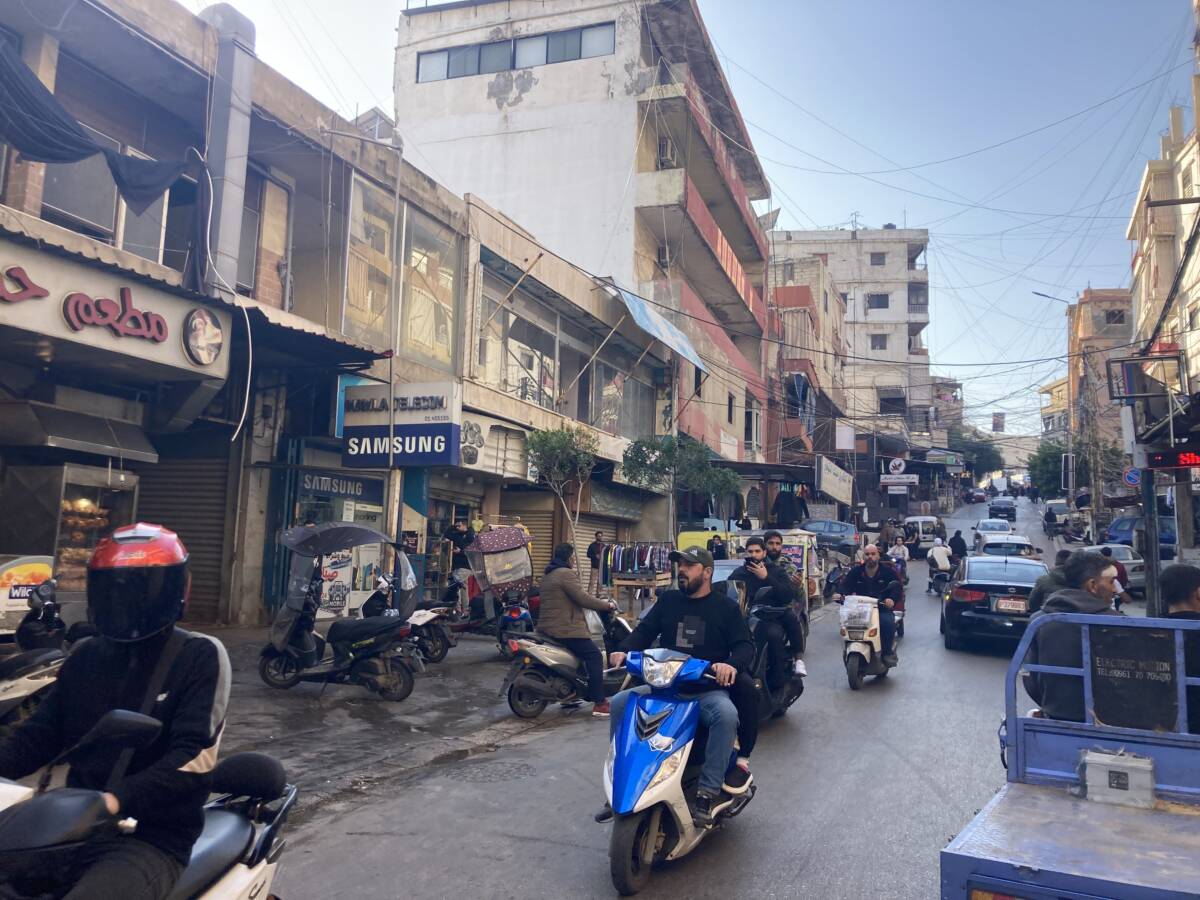Lebanon’s crackdown on Syrians’ unregistered motorcycles turns deadly
Motorcycles and scooters are a lifeline for many Syrians in Lebanon, but most cannot legally register them. As police crack down, they face fines, extortion and—as seen in the recent killing of a young man at a checkpoint in Beirut—violence.
6 March 2024
BEIRUT — A thick blue cast engulfs 17-year-old Rabia al-Othman’s left arm. Medical tape stretches across his left cheek, holding together a row of freshly-stitched sutures. Rabia’s worried friends and family gather around him in their small apartment in Burj al-Barajneh, a Palestinian refugee camp in Beirut where many Syrians, like Rabia and his family, also live.
Despite the chatter and concerned queries from his closest family and friends, Rabia is quiet—still in shock from a motorcycle accident, caused by a Lebanese police officer, that killed his close friend days earlier.
“We would go to work together every day,” Rabia told Syria Direct about his friend, 20-year-old Muhammad Zaid al-Hariri. “Sometimes he would sing. He had a beautiful voice.”
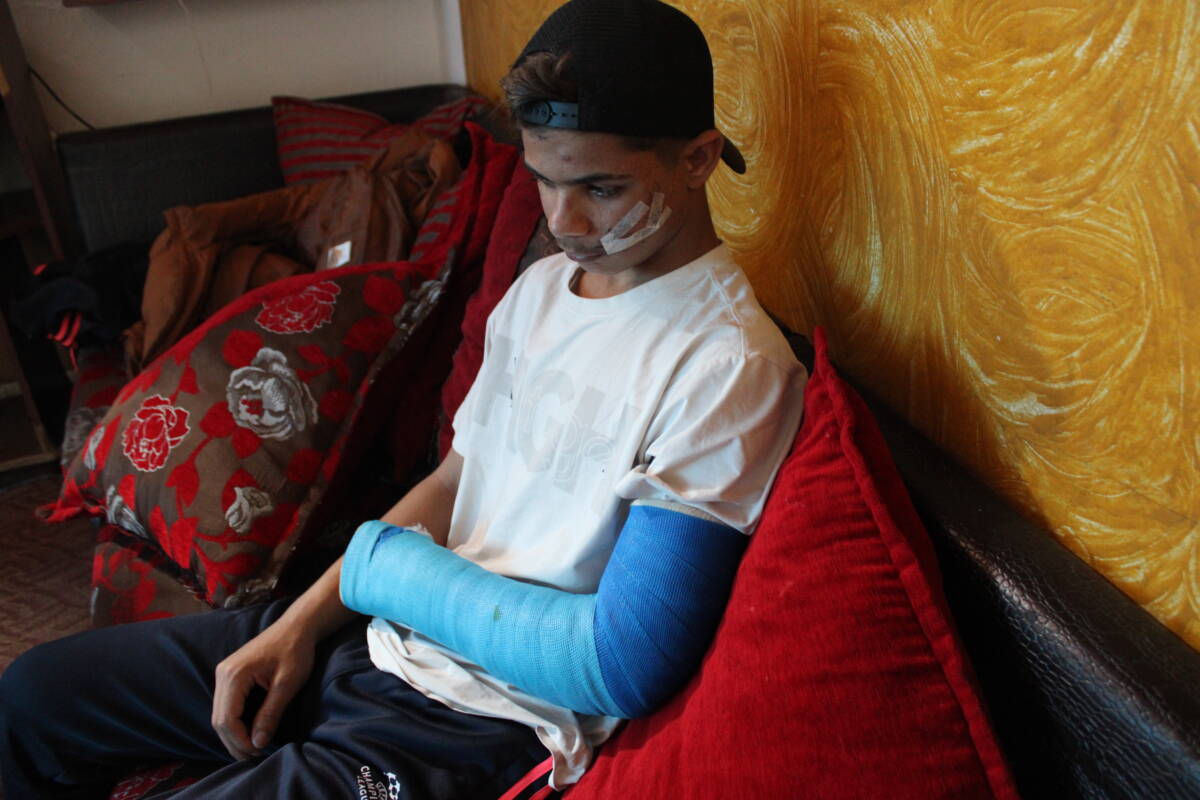
Rabia al-Othman, 17, sits at his home in Burj al-Barajneh, Beirut 27/02/2024 (Hanna Davis/Syria Direct)
On February 23, Rabia and Muhammad were on their way to work—riding a motorcycle as they usually did—when they spotted a police checkpoint. The authorities had already confiscated the motorcycle twice in recent months. Each time, it cost Rabia about a week’s salary from his painting job, $100, to retrieve it. He could not afford to pay a third time.
The motorcycle the two friends rode belongs to Rabia’s father, but is shared by 13 family members. Because Rabia’s father—who fled to Lebanon with his family in 2016 from Syria’s Aleppo countryside—does not have official residency documents, he cannot register the vehicle as required by law. Due to Lebanon’s stringent residency renewal regulations, over 80 percent of Syrians in the country do not have legal residency.
When Muhammad, who was driving that day, saw the checkpoint, he quickly turned around. But as they sped away, a police officer jumped out from behind parked cars and kicked the moving vehicle, according to Rabia’s testimony and surveillance footage of the incident. The blow caused Muhammad to lose control and the pair were thrown from the motorcycle, their bodies slamming into the pavement.
Muhammad suffered head injuries and was killed immediately, while Rabia was badly injured.
“I won’t ever forgive the man who killed my son,” Muhammad’s mother, Maysaa Hussein al-Hariri, 47, told Syria Direct over the phone from Damascus. “Everyone loved Muhammad. He had the kindest heart.”
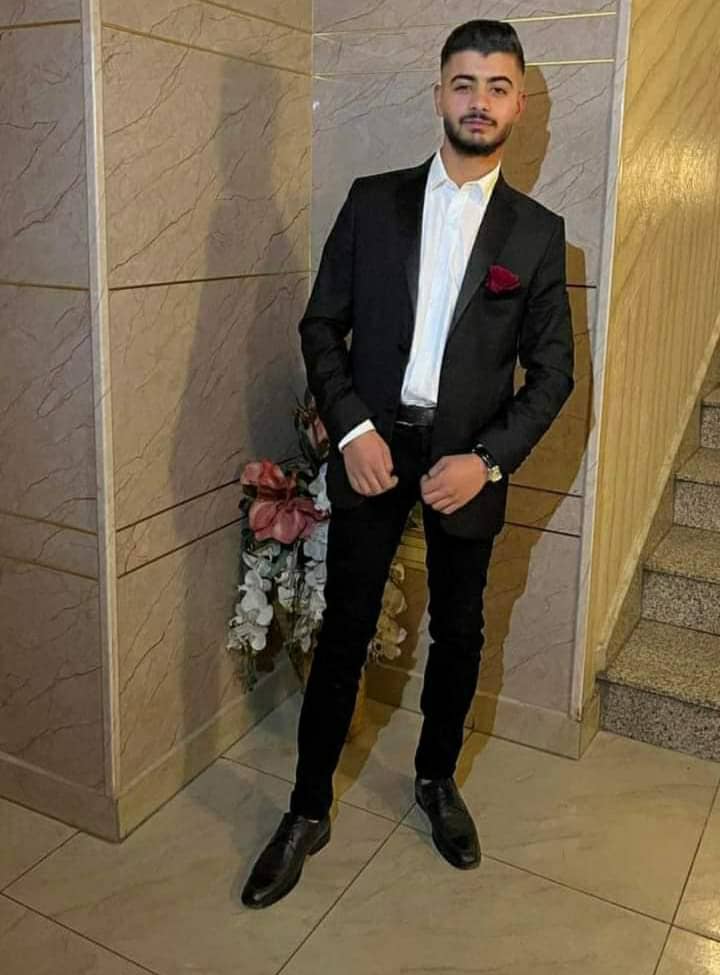
Muhammad Zaid al-Hariri in Syria in 2020, in a picture provided by his father (Zaid Abed al-Hamid al-Hariri)
Muhammad had been in Lebanon for about a year and four months before his death, working to send money back to Syria to support his family in Damascus. Rabia remembered Muhammad would almost always work overtime—nearly 13 hours a day.
Muhammad’s mother, father and four siblings were counting on Muhammad’s paycheck from February to get by this month, Maysaa said. Syria’s worsening economic crisis has hit them hard.
Hospital fees in Lebanon and the expenses to bring Muhammad’s body back to Syria for burial cost the family around $2,000. Neighbors and relatives helped out, but Muhammad’s family is still around $1,000 in debt. “There is no one else in the family to help us,” Maysaa said. “It was just Muhammad and now he’s passed away.”
“He was so cute and he was very kind. He never hurt or bothered anyone,” Muhammad’s mother said, her voice breaking into tears.
‘In danger’
An image of Rabia and Muhammad on the ground after the accident, a large pool of blood spreading below them, spread like wildfire on social media in late February. The incident triggered an uproar among Syrians, angry and stretched to the breaking point by discriminatory measures and restrictions in Lebanon—including police checkpoints.
Discrimination and legal barriers bar many Syrians in Lebanon, like Rabia and Muhammad, from a range of employment opportunities. In Beirut, the jobs they can find are often spread across the city, making motorcycles—which provide an affordable and efficient way to get to and from work—a lifeline.
But because so many Syrians do not have residency and cannot legally register their vehicles, that same lifeline also exposes them to fines, legal consequences, extortion and—as Rabia and Muhammad experienced—violence.
Hala Hamza, a lawyer who was hired by the Association of Syrian Workers in Lebanon to represent Rabia, said that the incident reflects a “racist pattern towards Syrians.” The police officer involved was also acting outside his authority when he intervened as Muhammad tried to flee the checkpoint, she added.
The officer who kicked the motorcycle is part of the Beirut Guard Regiment of the Beirut Municipal Police. In recent months, Lebanese police officers have been more active in setting up random checkpoints to seize unlicensed motorcycles, following an order from Lebanon’s caretaker Interior Minister Bassam Mawlawi last October to stop “motorcycles or mopeds driven by Syrians who don’t have a residency permit.” The order was issued as part of a series of memos calling for a crackdown on Syrian nationals in Lebanon.
“Checkpoints put in place to restrict the movement of Syrians across the country are discriminatory and part of a larger set of coercive measures that continue to be employed by Lebanese authorities—including municipalities and security services—to make Lebanon an unwelcome place for refugees and push them to return to Syria,” Ramzi Kaiss, Human Rights Watch’s Lebanon researcher, told Syria Direct.
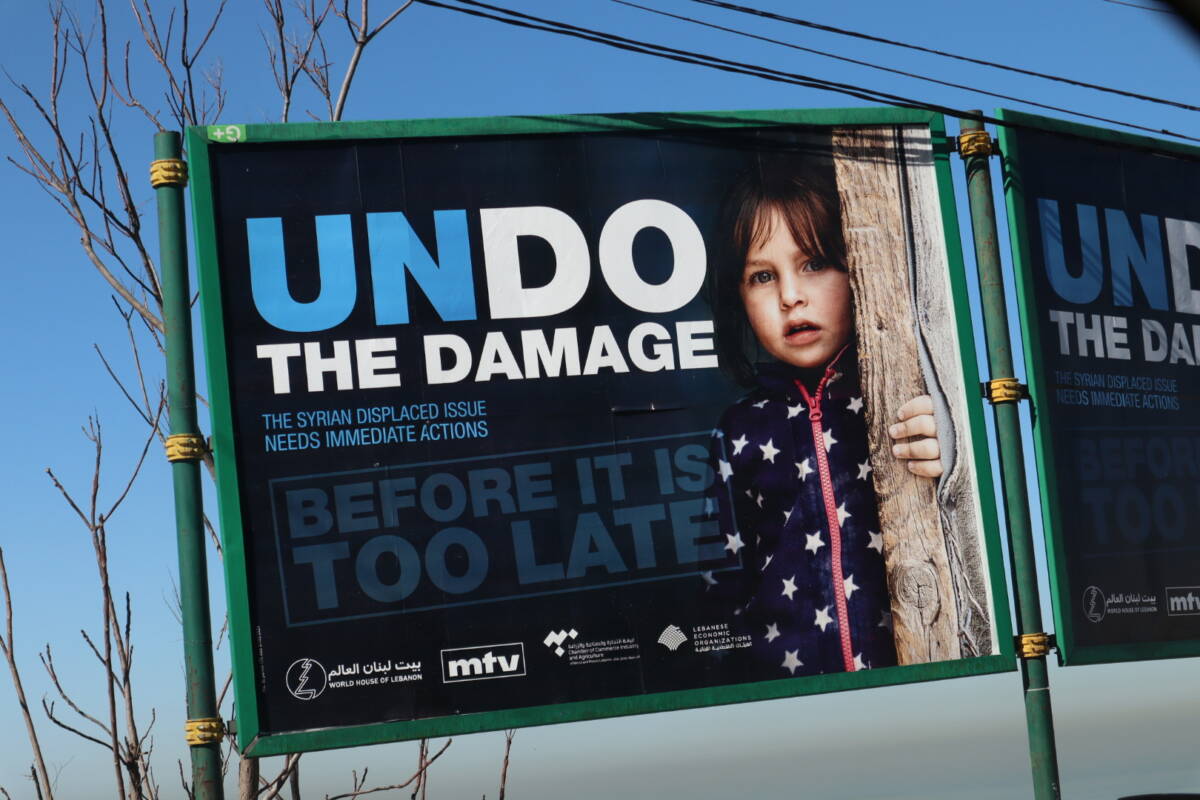
A billboard along the Damascus Highway near Kahaleh village in Mount Lebanon governorate, part of a new media campaign implying Syrians are responsible for Lebanon’s economic woes, 1/3/2024 (Yasmina Andary)
The Access Center for Human Rights (ACHR), a human rights organization based in Beirut and Paris, called the killing of Muhammad and injury of Rabia “a horrific crime and a flagrant violation of human rights” in a statement on February 27. Syrian refugees in Lebanon have faced arbitrary detention, violence and ill-treatment by municipal police officers, it added.
Hamza said that the officer likely suspected Rabia and Muhammad were Syrian when they tried to avoid the checkpoint, as Lebanese citizens would be less likely to flee. “It’s not about security. It’s because they’re Syrian,” she said.
Municipal police are not allowed to chase or touch traffic violators or their vehicles, Hamza added. Officers only have the power to write tickets for infractions, like traffic or registration violations, while Lebanon’s Internal Security Forces (ISF) are the branch responsible for arrests and chasing down suspects.
“Rabia and Muhammad are not criminals. They were not armed; they were kids and they committed a mere infraction,” Hamza said. “The officer should have known that pushing the bike would kill them or cause serious injuries,” she added. “It is not a mistake.”
The Lebanese army’s Intelligence Directorate has detained the police officer involved and taken him to the Defense Ministry, according to ACHR. The investigation is still ongoing, but Hamza said she is seeking prison time for the police officer and monetary compensation for Rabia’s injuries, which cost his family $750 in hospital fees and will put him out of work for a month.
The lawyer also expressed her concern that what happened to Muhammad and Rabia is not an isolated incident. “We will see more cases like this, from municipality officials and others,” she said. “The Syrian people are in danger.”
‘A tool to limit mobility’
Once Rabia heals, he will keep riding his motorcycle. “Of course, I’m scared to get caught,” he said. “But I have to work.”
Rabia earns about $20 each day painting houses in Beirut. If he were to take a taxi, he would pay around $10, or half a day’s work, for transportation. The city’s bus and van network also does not reach many of his work sites, he added.
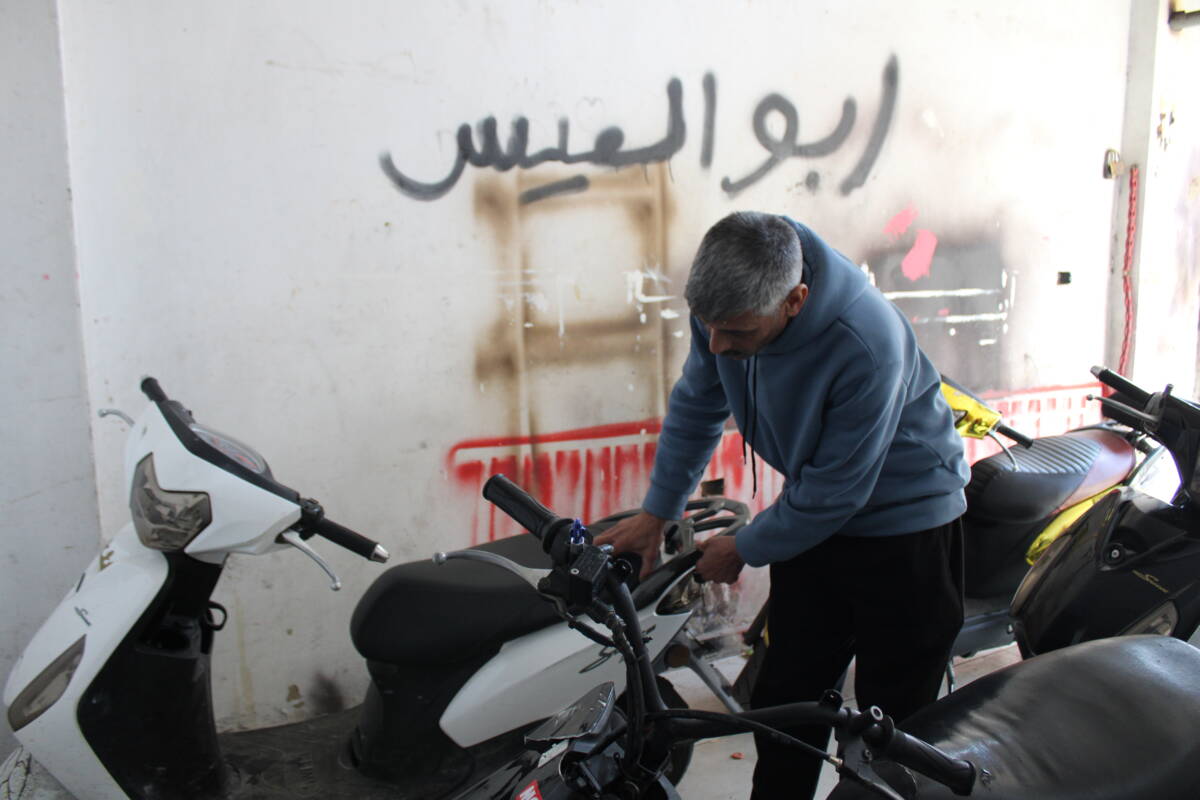
Rabia’s father, Issa Muhammad al-Othman, checks his moped in his garage in Burj al-Barajneh, Beirut, 27/02/2024 (Hanna Davis/Syria Direct)
Since 2015, multiple policies have targeted the mobility of Syrian workers, Dounia Salamé, a researcher of urbanism and part of the American University of Beirut’s (AUB) Urban Lab until 2021, told Syria Direct. These measures include curfews for Syrians in various cities and villages, as well as restrictions on Syrians obtaining driver’s licenses and night driving permits.
These policies are “difficult to document,” Salamé noted, as they are often not formally written into the law. Police officers also apply them “unequally,” she found while conducting research in 2018 on the impact of Beirut’s “militarized security” on the mobility of Syrian delivery drivers.
“Authorities have targeted Syrian and Palestinian workers as scapegoats of the [economic] crisis,” Salamé said. “The recent intensification at checkpoints is the newest tool they are using to harass them and limit their mobility.”
Five of Rabia’s friends, all Syrian, who were at his home the day Syria Direct visited said they had motorcycles of their own that they use for work. They try their best to avoid parts of Beirut where there are more checkpoints, or that are known to be more hostile to Syrians, Omar Faddawi, 21, said.
This often means taking long, roundabout routes to get to work, or giving up employment or education opportunities altogether if they are in a risky area. Omar wishes restrictions would be eased, so they could “have rights.” For now, “there is no law,” he said, turning to the other four young men, who nodded in agreement.
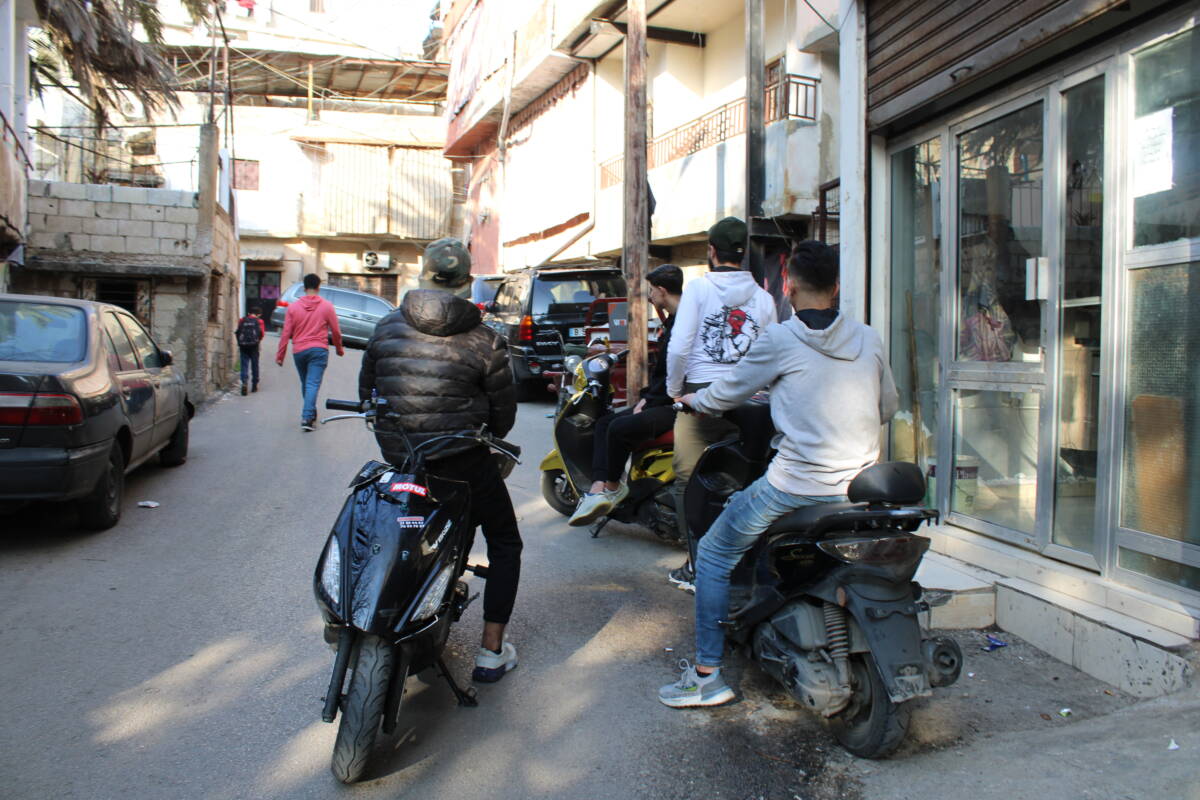
Rabia al-Othman’s friends pose with their motorcycles in Burj al-Barajneh, Beirut, 27/2/2024 (Hanna Davis/Syria Direct)
Crisis and corruption
Since Lebanon’s economic crisis took hold in 2019, public services in the country have deteriorated. Wages of the country’s security forces have dwindled, and government offices for registering vehicles and applying for driver’s licenses are understaffed and rarely open.
The salaries of municipal police officers have plummeted from what was once worth about $1,400 per month before the crisis to around $130. As a result, many police officers have resorted to corrupt practices to make money on the side, Hamza, Rabia’s lawyer, said.
Hamza said she has heard of multiple cases of municipal police officers stopping Syrians for unregistered motorcycles and then, in return for not taking the vehicle, requesting a payment (usually around $50) that they keep for themselves.
The amount is still much less than the fine required to retrieve a motorcycle after it has been confiscated, which ranges from $70 to $150, Syrians who have had their motorcycles confiscated told Syria Direct.
Syria Direct spoke to four Syrians who recently paid bribes between $30 and $50 to police officers stationed at checkpoints around Beirut.
Salamé also noted cases she has documented of police officers—or men posing as officers—using the threat of the law to obtain bribes in exchange for letting Syrians go. “It’s a manifestation of the power abuse of the state, which is always turning towards the most vulnerable people to extract resources from them and exploit them,” she said.
‘Anyone can abuse us’
As Rabia finishes speaking, his father, Issa Muhammad al-Othman, 48, interjects with a story of his own, holding up his left palm to show a large scar running across it.
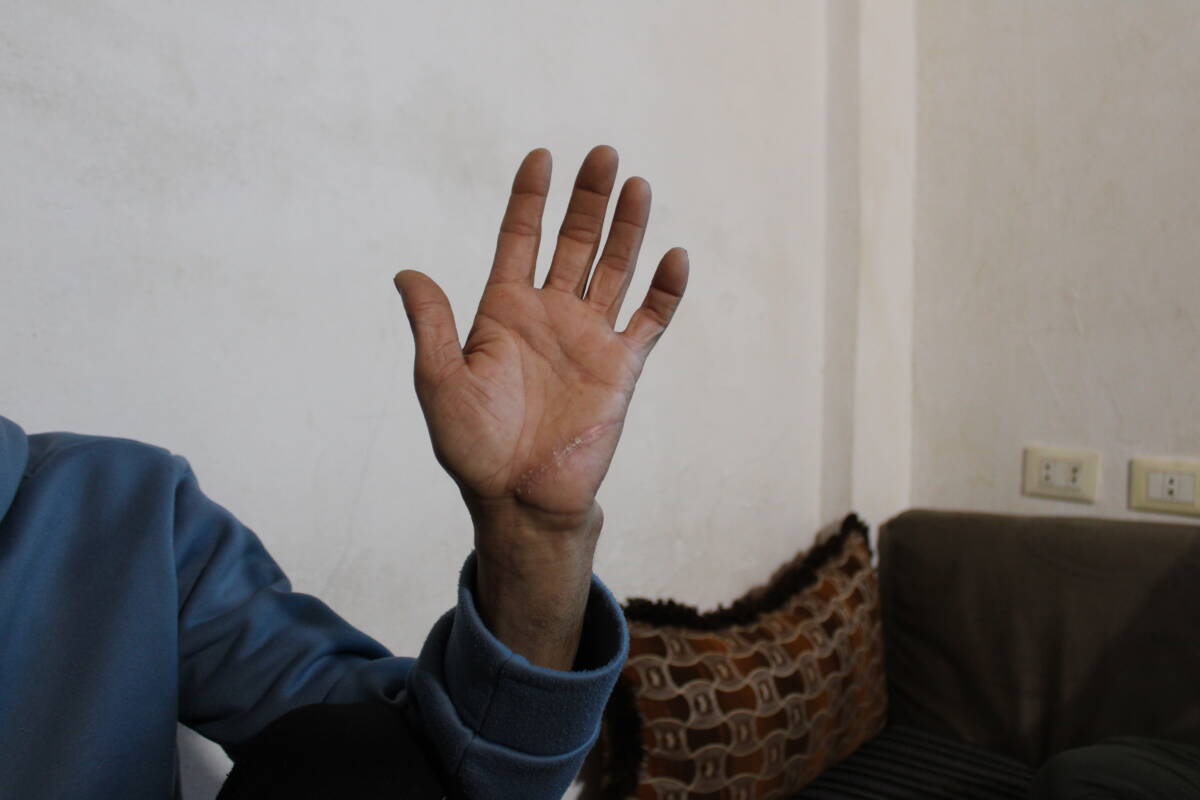
A scar on Issa Muhammad al-Othman’s left hand from a recent attack, 27/02/2024 (Hanna Davis/Syria Direct)
In early February, Issa was driving a small, three-wheeled cart in a traffic jam in Beirut when a car behind him began honking. When he pulled over to let the car pass, he said a man got out of the car and pulled out a knife, thrusting it towards him. He quickly brought his hands above his head to protect himself, and the blade slashed his palm. Issa believes the man suspected he was Syrian because of his appearance and because he was driving a vehicle more commonly used by Syrians.
“The majority of the racism in Lebanon is towards Syrians,” Issa said. “Syrians aren’t worth anything now. Anyone can abuse us,” he added. “We don’t have the support of the Syrian embassy or state.”
“We want justice for Muhammad,” he said somberly.
*Minor edits were made to a quote from Issa Muhammad al-Othman after publication to provide a more accurate translation.

